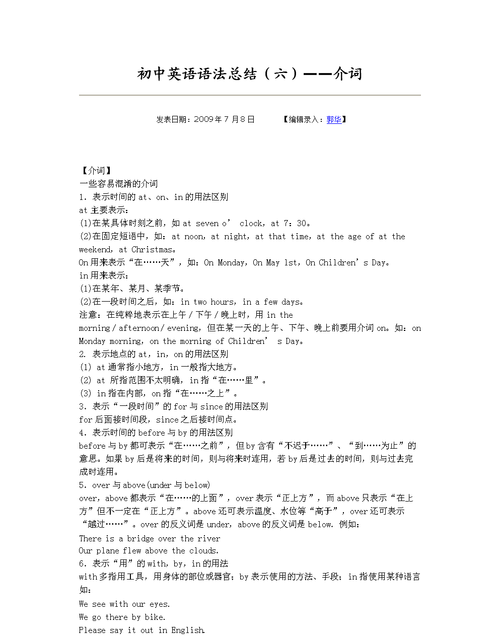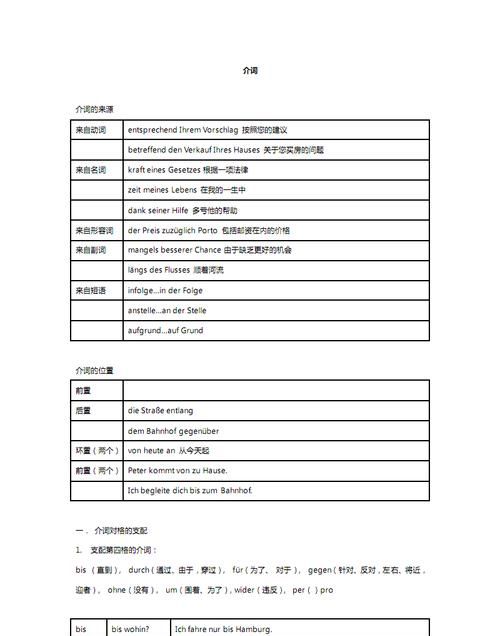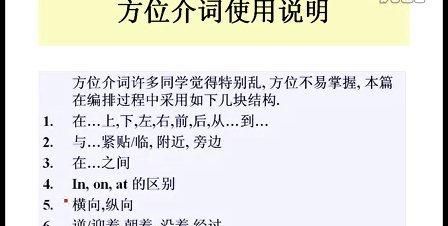本文目录
英语介词语法知识点
介词是英语语法中使用频率很高的一种词类,但是关于介词的语法你掌握了吗?下面由我为大家整理的关于英语介词的语法资料,希望大家喜欢!
介词又叫前置词,顾名思义,介词放在名词或相当于名词的前面。
介词和其后的名词构成介词短语,介词短语主要用来表示时间、地点、目的、程度和方式等。
介词还可同动词配合构成短语动词。
介词的分类:
从介词本身的结构来看:
1. 简单介词:at, in, on, since, from
2. 复合介词:as for 至于;as to 关于;out of 从,出自;into 进入;onto 到……上面去
3. 二重介词:from under 从……的下面;from behind 从……的后面;until after 直到……之后;from among 从……当中
4. 短语介词:according to 根据;ahead of 在……之前;apart from 在……之外;because of 由于;by means of 以……之手段;by way of 经由
从介词本身的意义来看:
1. 表示时间的介词
about, around, before, by, at, after, in, on, around, between, during, for, from, since, till, until, within
2. 表示地点的介词
about, at, in, on, over, through, across, along, around, before, between, beyond, down, up, to, toward, under, near
3. 表示方式的介词
by bus 乘公共汽车
see with one's own eyes 亲眼看...
4. 表示原因的介词
He was punished for stealing. 他因偷窃而被惩罚。
suffer from a cold 患伤风
5. 表示关于的介词
What is the book about? 这本书是关于什么内容的?(about关于一般情况)
6. 表示比较的介词
His face is as black as coal. 他的脸跟煤炭一样黑。
7. 表示除外的介词
He works every day but Sunday. 除星期天外,他每天都工作。
We all went except Tom. 除汤姆外,我们都去了。
The letter is good except for the spelling. 这封信除了拼写错误之外,还算是很通顺的。
Besides English, he studies German and French. 除英语外,他还学习德语和法语。(besides中文译成“除……外”,实则表示包含在内。)
8. 表示条件的介词
With your help, we might finish the work earlier. 有你的帮助,我们可能早点做完这工作。
Man cannot live without water. 如果没有水人就不能活。
9. 表示结果的介词
She tore the letter to pieces. 她把信撕个粉碎。
10. 表示对于的介词
Sea air is good for the health. 海上的空气对健康有好处。
To her it was all unusual. 这一切对她都很不平常。
什么叫做介词短语
介词 + 名词(或者代词,或者相当于名词的其他词类、短语、从句)= 介词短语
in the morning 在早晨
under the tree 在树下
from China 来自中国
*注意区别“介词短语”和“短语介词”:
介词短语是(介词 + 名词性短语),可以单独作为句子成分;
短语介词是(一个相当于介词的短语),不能单独作为句子成分。
短语介词:
according to 根据
ahead of 在……之前
apart from 在……之外
because of 由于
by means of 以……之手段
by way of 作为
介词短语的位置
一、位于动词之后表示位置
She lives in Shanghai.
她住在上海。
The children are playing in the street now.
现在孩子们在街上玩。
二、位于动词之后表示方向
He went into the kitchen.
他到厨房里去。
三、位于句首表示突出、对照
In the garden everything was so beautiful.
花园里一切都是那么美丽。
四、位于句首,倒装主谓
Behind me lay the fields.
在我的后面是一片田野。
On the desk is a bag.
桌子上有一个袋子。
五、位于名词之后,用于限制前面的名词
The apple on the plate is for you.
盘子上的苹果是给你的。
介词短语的句法功能
一、介词短语作表语
The book you want is on the table.
你要的那本书在桌子上。
二、介词短语作宾补
I saw a tall man under the tree.
我看到树下有个高个子的男人。
三、介词短语作定语(后置定语)
The man under the tree is my father.
树下的那个男人是我爸爸。
四、介词短语作状语
1. 作地点状语
We live in Hangzhou.
我们住在杭州。
2. 作时间状语
She got here at four.
她在4点到这儿的。
3. 作方式状语
They came here by train.
他们乘火车来这儿。
4. 作原因状语
The game was postponed because of rain.
因为下雨运动会被推迟了。
5. 作条件状语
There will be no living things without water.
没有水就没有生物。
6. 作目的状语
He ran for shelter.
他跑去避雨。
7. 作让步状语
They play football in spite of the rain.
他们冒雨踢足球。
8. 作程度状语
To what extent would you trust them?
你对他们信任程度如何?

小升初英语介词的用法归纳
关于小升初英语介词的语法
从介词本身的结构来看:

1. 简单介词:at, in, on, since, from
2. 复合介词:as for 至于;as to 关于;out of 从,出自;into 进入;onto 到……上面去
3. 二重介词:from under 从……的下面;from behind 从……的后面;until after 直到……之后;from among 从……当中
4. 短语介词:according to 根据;ahead of 在……之前;apart from 在……之外;because of 由于;by means of 以……之手段;by way of 经由
从介词本身的意义来看:
1. 表示时间的介词
about, around, before, by, at, after, in, on, around, between, during, for, from, since, till, until, within
2. 表示地点的介词
about, at, in, on, over, through, across, along, around, before, between, beyond, down, up, to, toward, under, near
3. 表示方式的介词
by bus 乘公共汽车
see with one's own eyes 亲眼看…
write in ink 用墨水写…
on foot 步行,徒步
He looked at me without expression. 他毫无表情地看着我。
4. 表示原因的介词
He was punished for stealing. 他因偷窃而被惩罚。
suffer from a cold 患伤风
be ashamed of 因……而感到羞愧
shake with cold 因寒冷而发抖
5. 表示关于的介词
What is the book about? 这本书是关于什么内容的?(about关于一般情况)
I heard him talk on Chinese medicine last night. 昨晚我听到他讲中国医学。(on关于理论、学术)
a long story of adventure 一个长篇冒险故事
6. 表示比较的介词
His face is as black as coal. 他的脸跟煤炭一样黑。
He saw a number of small hard things like stones. 他看见一些像石头一样的小小的坚硬的东西。
7. 表示除外的介词
He works every day but Sunday. 除星期天外,他每天都工作。
We all went except Tom. 除汤姆外,我们都去了。
The letter is good except for the spelling. 这封信除了拼写错误之外,还算是很通顺的。
Besides English, he studies German and French. 除英语外,他还学习德语和法语。(besides中文译成“除……外”,实则表示包含在内。)
8. 表示条件的介词
With your help, we might finish the work earlier. 有你的帮助,我们可能早点做完这工作。
Man cannot live without water. 如果没有水人就不能活。
9. 表示结果的介词
She tore the letter to pieces. 她把信撕个粉碎。
10. 表示对于的介词
Sea air is good for the health. 海上的空气对健康有好处。
To her it was all unusual. 这一切对她都很不平常。
小升初英语语法大全:介词
1、介词是一种虚词。不能单独作句子成分,它只有跟它后面的宾语一起构成介词短语,才能在句子中起作用。
有:in, on, under, with, behind, about, near, before, after, for, to, up, down, from, in front of, out of, from…to…, at the back of…
2、表示时间的介词有:at, on, in。
(1)at表示“在某一个具体的时间点上”,或用在固定词组中。如:at ten o’clock, at 9:30 a.m., at night, at the weekend…
(2)on表示“在某日或某日的时间段”。如:on Friday, on the first of October, on Monday morning…
(3)in表示“在某一段时间(月份、季节)里”。如:in the afternoon, in September, in summer, in 2005…
3、in一词还有其他的固定搭配,如:in blue(穿着蓝色的衣服),in English(用英语表达),take part in(参加)。
练一练:
1、选用括号内恰当的介词填空。
1) What’s this _______ ( at, on, in ) English?
2) Christmas is _______ ( at, on, in ) the 25th of December.
3) The man_______ ( with, on, in ) black is Su Hai’s father.
4) He doesn’t do well _______ ( at, on, in ) PE.
5) Look at those birds _______ ( on, in ) the tree.
6) We are going to meet _______ ( at, on, in ) the bus stop _______ ( at, on, in ) half past ten.
7) Is there a cat _______ ( under, behind, in ) the door?
8) Helen’s writing paper is _______ ( in, in front of ) her computer.
9) We live _______ ( at, on, in ) a new house now.
10) Does it often rain _______ ( at, on, in ) spring there?
2、圈出下列句子中运用不恰当的介词,并将正确的答案写在横线上。
1) Jim is good in English and Maths.
2) The films were in the ground just now.
3) They are talking to their plans.
4) How many students have their birthdays on May?
5) Women’s Day is at the third of March.
6) I can jog to school on the morning.
7) Did you water trees at the farm?
8) Can you come and help me on my English?
9) I usually take photos in Sunday morning.
10) What did you do on the Spring Festival?
小升初英语语法大全:形容词、副词
1、形容词表示某一事物或人的特征,副词表示某一动作的`特征。
形容词和副词有三种形式:原形、比较级、最高级。比较级:+er 最高级:the …+est
两个重要特征:as……as中间一定用原形,than的前面一定要+er。
2、形容词、副词比较级的规则变化如下:
(1)一般直接+er。如:tall - taller, fast - faster 单音节词如果以-e结尾,只加-r。如:late - later
(2)重读闭音节词如末尾只有一个辅音字母,须双写这个字母,再加-er。如:big - bigger, fat - fatter
(3)以辅音字母加-y结尾的词,变y为i,再加-er。如:heavy - heavier, early - earlier
(4)双音节和多音节词的比较级应在原级前加more构成。如:beautiful - more beautiful, careful - more careful, quietly - more quietly, interesting - more interesting
(5)有些不规则变化的,须逐一加以记忆。如:good/well – better, bad/ill – worse, many/much – more, far – farther/further, old – older/elder…
练一练:
1、写出下列形容词、副词的比较级。
big good long tall old
short thin heavy young fat
light strong high far low
early late well fast slow
2、用括号内所给单词的适当形式填空。
1) I can swim as _______ (fast) as the fish, I think.
2) Look! His hands are _______ (big) than mine.
3) I think you do these things_______ (well) than your classmates.
4) Whose bag is _______ (heavy), yours or mine?
5) Does Jim run as _______(slow) as David? Yes, but Mike runs_______ (slow) than them.
6) You have seven books, but I have _______ (many) than you. I have ten.
7) I jump _______ (far) than some of the boys in my class.
8) I’m very_______ (thin), but she’s _______ (thin) than me.
9) It gets _______and_______ (warm) when spring comes here.
小升初英语语法大全:英语中的八种词性
乐加乐英语:小升初英语语法大全:英语中的八种词性,供大家参考学习~
Words are used to form patterns of English grammar and syntax. Each word falls into one of eight categories referred to as parts of speech. Here are the eight commonly recognized parts of speech.
英语的语法和句法中也会形成词的类型。每个词都会被归为八类中的一类,这里我们要讲的就是英语中八类最常见的词性。
Certain words have further categorization such as: adverbs of frequency: always, sometimes, often, etc. or determiners: this, that, these, those . However, the basic categorization of words in English fall into these eight categories.
具体的词还会有更进一步的分类,比如always(总是), sometimes(有时), often(经常)等等这些被叫做频率副词,还有this(这个), that(那个), these(这些), those(那些)被叫做限定词,不过基本的英语词类还是有这八类的。
The Eight Parts of Speech
八种词类
名词
A word which is a person, place, thing or idea.
描述一个人、一个地点、一个东西或者一种想法的词。
例如:
Mount Everest, book, horse, Peter, strength, car, Empire State Building, China, house, child
珠穆朗玛峰,书,马,皮特(人名),力量,汽车,帝国大厦,中国,房子,孩子
代词
A word that is used to take the place of a noun.
用来指代一个名词的词
例如:
I, they, their, ourselves, itself, your, my, nobody, who, which, her, we
我,他们,我们自己,它自己,你的,我的,没有人,谁,哪个,她(宾格),我们
形容词
A word that is used to describe a noun or pronoun.
一个用来描述一个名词或者代词的词
例如:
proud, purple, French, few, this, huge, sad, second, none
骄傲的,紫色的,法国的,很少的,刚过去的,巨大的,悲伤的,其次的,没有的
动词
A word that indicates an action, being or state of being.
一个表示动作进行或者存在的状态的词
例如:
play, run, think, study, smell, wait, be, drive, renounce, fill
玩,跑,想,学习,闻,等,是,驾驶,拒绝,填充
副词
A word that is used to describe a verb which tells how, where, or when something is done.
副词是用来描述一个动作怎样完成、在哪里完成或者什么时间完成的词
例如:
carefully, often, very, [w]intelligently, quite, too, rarely, never
仔细地,经常,非常,聪明地,非常,太,很少,从不
连词
A word that is used to join words or groups of words.
一个用来连接几个词或者几组词的词
例如:
and, or, but, neither, because, while, since, although
和,或者,但是,既不是,因为,而,自……以来,虽然
前置词,汉语中多叫介词
A word used indicating the relationship of a noun or pronoun to another word.
一个用来表明一个名词或代词和另一个词的关系的词
例如:
in, until, of, from, after, under, beyond, across, toward
在……里面,直到,……的,从……开始,在……之后,在……下面,超出,穿过,向
感叹词
A single word used to express strong emotion.
一个表达强烈的感情的词
例如:
Wow! Ah! Oh! No!
哇!啊!哦!不!
编辑推荐:
小升初英语语法
小升初英语语法大全:名词的所有格
乐加乐英语:小升初英语语法大全:名词的所有格,供大家参考学习~
1. 在词尾不是s 的单数或复数名词之后加-s
Tom's bike 汤姆的自行车
a women's hospital 妇女医院
a children's palace 少年宫
oxen's temper 牛脾气
2. 在词尾是s 的单数名词之后加' 或's 都可以
my boss' office 或 my boss's office 我老板的办公室
Dickens' novels 或 Dickens's novels 狄更斯的小说
3. 在词尾是s 的复数名词之后加'
a girls' high school 女子中学
birds' nets 鸟窝
4. 在复合名词或是名词短语最后的一个词的词尾加-s
my brother-in-law's hat 我姐夫的帽子
somebody else's bag 别人的包
a year or two's absence 一两年的离别
the President of America's car 美国总统的座车
但是,最后一个词的词尾若是s ,只加'
go-betweens' arrangements 中间人的安排
5. 名词之后有同位语时,将同位语变成所有格
Have you seen my sister, Mary's bike? 你有没有看见我姐姐玛丽的自行车?
6. 共同拥有或是个别拥有的区别
Mary and Betty's parents(两人父母相同)
Mary's and Betty's parents(两人各自的父母)
John and Mary's school(两人同在一所学校)
John's and Mary's schools(两人分别在不同的学校)
7. "of + 名词"构成的所有格
the door of the room 房间的门
the tittle of the film 影片的名字
编辑推荐:小升初英语语法
小升初英语语法大全:不定冠词的用法
乐加乐英语:小升初英语语法大全:不定冠词的用法,供大家参考学习~
不定冠词的用法
不定冠词有"a 和 an"两种形式。"a"用在以辅音开头的词前,"an"用在以元音开头的词前。
注意:判断一个词是以元音开头还是以辅音开头,是根据读音而不是根据字母,这一点很多初学者会搞错哦。
1. 用于可数名词的单数形式前,表示“一”
There is a tiger in the zoo. 动物园里有一只老虎。
2. 表示一类人或物
A tiger can be dangerous. 老虎可能有危害性。
3. 表示“某一个”的意思
A gentleman wants to see you. 有位先生要见你。
4. 表示“同一”的意思
They are nearly of an age. 他们几乎同岁。
The two shirts are much of a size. 这两件衬衫大小差不多。
5. 表示“每一”的意思
We go swimming four times a week. 我们每周去游泳四次。
6. 用在作表语的单数可数名词前,表示身份、职业
My mother is a teacher. 我妈妈是老师。
7. 第一次提到的人或事物,但不特别指明是哪一个
Long long ago there was an old king who had a very beautiful daughter. 很久很久以前,有一个年老的国王,他有一个非常美丽的女儿。
8. 在 such a,quite a 句式中
He is quite a good actor. 他是一个相当好的演员。
Don't be in such a hurry. 不要如此匆忙。
9. 用在某些表示数量的词组中
a couple of 一对
a dozen 一打(也可以用 one dozen)
a lot of 许多
a great many 很多(修饰可数名词)
a great deal/amount of 大量(修饰不可数名词)
;小学需要掌握的英语介词以及用法有哪些
表示时间的介词称为时间介词.表示时间的介词有:at, on, in, before, after等.
一、at, on和in
① at 表示:(在(某时刻、时间、阶段),在……岁时)
My cousin joined the army at fifteen.
我表哥十五岁参的军.
② on 表示:在(某日),在周末,在……节日
He was born on the 15th of August in 1769.
他出生于1769年8月15日.
③ in 表示:在……事后,在……期间,在……年/月
She went to America in 2000.
她2000年去了美国.
at, on 和in 作时间介词的比较:
① at 表示具体时间点.
② on 后可以跟表日期、星期、节日的词,还可以指具体某一天的早、中、晚.
③ in 泛指一天的早、中、晚,还可以表示一段时间,如:周、年、月、季节等.
二、before和after
① before 表示:在……之前 before eight o’ clock 八点之前
Spring comes before summer.
夏天之前是春天.
② after 表示:表示……之后 after lunch 午饭之后
Come to my office after school.
放学后请来我办公室.
表示做某事的方法、手段的介词有by, with, in, at, on.
一、by
by表示:用,以,靠,通过……方式.by表示手段时后接动作或制作方式.“by + 交通工具”表示交通方式.
by bike 骑车 by bus 坐公车 by taxi 搭出租
by train 坐火车 by ship 乘船 by air 坐飞机
Linda usually goes to work by subway.
琳达通常做地铁上班.
She makes a living by teaching.
她考教书谋生.
二、with
with 表示:用,以.with表示手段时,后接工具、材料或具体内容.
write with a pen 用钢笔写
eat with knife and fork 用刀叉吃
see with one’s eyes 用眼睛看
I killed the fly with a swatter.
我用苍蝇拍打死那只苍蝇.
She cut the cake with a knife.
她用刀切开了蛋糕.
三、in
in 表示:用,以.in表示用某种方式,如:颜色、笔墨、语言、声音、服饰等.
speak in English 用英语说
talk in a high voice 高声说话
I wrote a letter in ink.
我用钢笔写了一封信.
Try to express yourself in English.
试着用英语表达一下.
表示空间的介词有:at, in, on, over, above, under, below 等表示静态位置的介词和from, to, up, down, through, across 等表示动态方向的介词.
一、at, on 和 in
① at 表示:(地点、位置)在……
② on 表示:(位置)在……上面
③ in 表示:(地点、位置或空间)在……里,在……中,在……上
Her fans have arrived at the airport.
她的影迷已经到达了机场.
Look at the picture at the top of the page.
请看以下这一项上面的图片.
Is my pen on the desk or in the desk?
我的钢笔是在桌子上还是在抽屉里呢?
Some kids are playing in the yard and others are playing in the room.
有些孩子在院子里玩,其他则在房间里玩.
at,on 和 in 作空间介词的比较
① at用于表示一个较小的场合,这个地点被当作一个点来看待.
② on 表示在某一平面或线上,强调与某物体有接触.
③ in 表示在较大的地方,在某立体空间或平面范围之内.
二、about 和 around
① over 二者都表示:在……周围/各处,围绕.但
② above about强调无方向.
We walked about in the town.
我们在城里到处游逛.
Dudu is running around the fence.
嘟嘟在绕着篱笆跑.
Let’s plant trees around the house.
让我们在房子周围栽上树.
三、over 和 above
① under 表示:在……正上方,越过
② above 表示:在……上方
I saw a wood bridge over the river.
我看见河上有座木桥.
Look! Some birds are flying above the clouds.
看!一些鸟儿在云朵上飞翔.
over和above作空间介词的比较
① over强调在某人或某物的正上方,而且两物体表面没有接触.
② above 强调位置上某物体的上方,并不一定是正上方,而且两物体表面也没有接触.
四、under 和 below
① under 表示:在……的正下方
② below 表示:在……下方
Please read the words below the picture.
请读图片下面的文字.
Look! A big mouse hides under the armchair.
看!一只大老鼠躲在扶手椅下面.
under 和 below 作空间介词的比较
① under 强调在某物的下方,完全覆盖两物体表面可以接触也可以不接触.
② below 强调位置低于某参照物,但并不一定是正下方.
五、between 和 among
① between 表示:(位置、时间、数量等)在……之间(两者之间)
② among 表示:在……中间(三者或三者以上之间)
I often fly between Beijing and Shanghai.
我经常在北京和上海之间飞来飞去.
Come here between eight and nine o’ clock.
请把点到九点之间过来.
Susan is among the crowd.
苏珊是人群当中.
六、into 和 out of
① into 表示:进来
② out of 表示:出去
Get out of the room.
从房间里出去!
Bob walked into the room.
鲍勃走进房间.
He is working in the office.
她在办公室里工作.
七、behind 和 in front of
① behind 表示:在……后面
② in front of 表示:在……前面
There is a fountain in the front of the park.
公园的前面有一个喷泉.
Susan sits in front of me and Dudu sits behind me.
苏珊坐在我前面,嘟嘟坐在我后面.
八、up 和 down
① up 表示:往上,向……顶上
② down 表示:往下,沿着……往下
The monkey is climbing up the tree.
猴子正在往树上爬.
Tears ran down her face.
眼泪从她的脸上流了下来.
九、across 和 through
① across 表示:穿过,跨过
② through表示:穿过,通过
There is a bridge across the river there.
那儿有座桥横跨在河上.
A train is running through the tunnel.
一列火车正从隧道中穿过.
十、by 和 near
① by 表示:在……旁边
② near 表示:在……附近
Come over here and stand by me.
过来站在我旁边吧.
We are planning to camp by the lake.
我们打算到湖边露营.
There are some big apple trees near the house.
房子附近有一些大苹果树.
The new hospital is near our school.
新医院里我们学校不远.
十一、其他空间介词
① along 表示:沿着,顺着
② to 表示:到……,去……,向……
Let’s walk along the street.
让我们沿着街散散步.
We drove along the freeway.
我们驱车沿着高数公路行驶.
The child pointed to the polar star.
那孩子指着北极星.
I’m going to the bakery.
我想要去那家糕饼店.
*第一个to表示“指”的方向、目标.
第二个to表示到达的目的地.
除了按上面介绍表示时间关系、空间关系、方式、手段等的介词外,还有一些重要的介词:
一、of 的用法
① of 表示:……的(表示所属、所有关系)
a cover of this book
这本书的封皮
a friend of my parents
我父母的一个朋友
② of 表示:……之中的(表示部分)
some boys of the team
小组里的几个男生
the end of the story
故事的结尾
Two students of our class joined in the match.
我们班里的两个同学参加了这场比赛.
All of us approved his plan.
我们全都赞成他的计划.
③ of 表示:……份/量的,……的种类的(表示量、种类)
a drop of water
一滴水
a pair of shoes
一双鞋
I want two cups of coffee.
我要两杯咖啡.
二、with 的用法
① with 表示:具有,有……的,随身带着
It is a dog with black spots.
它是一只长着黑色斑点的狗.
Take an umbrella with you.
带把雨伞吧!
② with表示:和……一起,同……一起,偕同
I went to Disneyland with my mother.
我和妈妈一起去了迪斯尼乐园.
Jane likes to play with Mimi.
简喜欢和咪咪玩耍.
③ with 表示:随着……
The wine improves with age.
这种酒越陈越香.
I get up with the sun every day.
我每天日出就起床.
三、for 的用法
① for 表示:为了……(表示目的、用途、利益)
Give me a knife for cutting bread.
给我一把切面包的刀子.
I’ve found it for you.
我已经为你找到了它.
What can I do for you?
我能为你做些什么吗?
② for 表示:一段距离或时间
He has run for a mile.
他跑了一英里.
I’ve studied in Beijing for three years.
我在北京学习三年了.
Please bake the cake for 40 minutes.
请将蛋糕烤四十分钟.
③ for 表示:因为,由于(表示原因)
Thank you for your help.
谢谢你的帮助.
Andy jumped for joy at the good news.
安迪听到这个消息高兴的跳了起来.
We could hardly see for the mist.
由于大雾,我们几乎看不见了.
四、like 的用法
① like表示:像……(一样),似……(一样)
They are like brothers and sisters.
他们情同手足.
② like 表示:是什么样子,怎样
Andy looks just like his father.
安迪和他爸爸像极了.
五、from 的用法
① from 表示:(时间或场所)从……,自……
We work from Monday to Friday.
我们周一到周五上班.
Charlie will fly from New York to London.
查理要从纽约飞往伦敦.
The cat jumped down from the top of the wall.
猫从墙头跳了下来.
② from 表示(两地的距离)离
The nearest hospital is 10 miles from my house.
最近的医院离我家十英里远.
We live about 5 kilometers from Boston.
我们住在离波士顿约五公里的地方.
③ from 表示:出自……,来自……
Did you have a (phone) call from him?
你接到他的电话了吗?
Where are you from?
你来自哪里?
Susan got a letter from her aunt.
苏珊收到一封她姨妈的来信.
六、at, about, to 和 in 的其他用法
① at 表示:对着……, 朝着……,向……(表示方向,目标)
He threw a bone at the dog.
他用一块骨头砸狗.
Please look at the blackboard.
请看黑板.
Jack shot at the deer but missed.
杰克朝鹿开了一枪,但是没有打中.
② about 表示:关于……,涉及……
He told me a story about ghosts.
他给我讲了一个鬼故事.
Don’t worry about me.
不要担心我.
They are talking about English learning.
他们在谈论英语学习.
③ to 表示:对于,给,向(表示对象)
Jane is always very kind to others.
简总是对别人很友善.
Please send some food to them.
请给他们送些食品去.
Have you told all the news to John?
你把全部的消息都告诉约翰了吗?
④ in 表示:穿着,戴着
Who is the man in black?
那穿黑色衣服的人是谁?
Tom is in a purple hat.
汤姆戴着紫色帽子.
The girl in uniform is Mary.
穿校服的那个女孩是玛丽.

介词的用法讲解视频
以下是我为大家整理的介词的用法 总结 讲解,希望能帮助大家更好地认识介词的用法,提高英语水平。
1.介词的分类
(1)简单介词如:at,by,for,from,in,of,on…
(2)复合介词如:into,onto,within,out of…
(3)双重介词 如:from under,since before,until after…
(4) 短语 介词如:in front of,because of,ahead of,according to…
另外,有的介词可以兼作副词(如:around,over等),有的介词可以兼作连接词(如:after,before等)。
2.介词短语在句中的作用
(1)作定语
例如:The man in black is Mr Zhang.穿黑衣服的人是张先生。
He is a man of wealth.他是个有钱人。
China is a country with a long history.中国是历史悠久的国家。
(2)作表语
例如:He was already in his forties.他已经四十多岁了。
You must remain in bed.你必须得卧床休息。
He was against slavery.他反对奴隶制。
(3)作状语
例如:At seventeen,he began to learn acting.
十七岁时,他开始学习表演。(时间状语)
We put the play on in a theatre.
我们在剧院上演这出戏。(地点状语)
We jumped with joy.
我们高兴得跳了起来。(原因状语)
He returned home for his dictionary.
他回家去取字典。(目的状语)
We went there by bike.
我们骑自行车去那儿的。(方式状语)
In spite of the heavy rain,they arrived.
尽管雨下得大,他们还是到了。(让步状语)、
(4)作补足语
例如:I found everthing in good condition.我发现一切状况良好。
Eevn his way of walking down the street and turning a corner could be recognaized as his own.
甚至他在街上走路时和在拐角处转弯时的那种姿态,都可以认为是他独有的动作。
The heavy rain kept us inside the house.(大雨使得我们待在了家里。)
3.关于介词值得注意的几个问题
(1)同一个介词的不同用法和意义,用at为例。
(A)表示地点,在……They are waiting for me at the gate.
(B)表示时间,在……时(刻) We usually get up at half past five every morning.
(C)表示状态,(正)在……中The Browns are at table.
(D)表示速度、价格,按……The truck ran at 40 miles an hour.
(E)表示动作对象、目标、向……Bob threw a stone at a dog.
(F)表示原因,由于…… He was surprised at his friend’s rudeness.
(G)表示能力,擅长于…… My sister is good at painting.
(2)同一介词跟不同动词构成不同意义的短语动词,以on为例。
(A)I hope to call on you in your office this afternoon.( 拜访 )
(B)We live on our salary.(依靠……生活)
(C)The price depends on quality.(依赖)
(D)He insisted on her staying in London.(坚持要)
(E)The doctor operated on her chest yesterday.(给……动手术)
(F)Put on your coat before you go out.(穿上)
(G)The village has taken on a new look.(呈现)
(3)同一动词跟不同介词构成不同意义的短语动词,以look为例。
(A)He looked about him but saw no one.(环顾)
(B)The boy is old enough to look after himself.(照料)
(C)Look at the photo,please.(看)
(D)What are you looking for?(寻找)
(E)I’ll look into the matter as soon as possible.(调查)
(F)I looked through today’s newspaper but I found nothing important in it.(浏览)
(G)You should learn how to look up word in a dictionary.(查阅)
(4)正确区分介词to和动词不定式符号to。
The murderer was sentenced to death.(介词)
The coffee in the cup is too hot to drink.(动词不定式符号)
(5)几种特殊的介词宾语。
(A)不定式作宾语:I desire nothing but to have a quiet room to study in.
(B)形容词作宾语:Although Spring has come,it is still quite cold instead of warm.
(C)副词作宾语:His father is fresh from abroad.
(D)介词短语作宾语:He has lived in Beijing since before liberation.
(E)由what,when,where,how等引导的从句作宾语(that从句例外):
(6)不要遗漏介词:
(A)不定式作定语修饰名词时,若该名词在逻辑上与其有动宾关系,不及物动词要有相应的介词。
Give me a piece of paper to write on.
(B)不定式在enough…to…句型中作结果状语时,若 句子 的主语在逻辑上与其有动宾关系,不及物动词要有相应的介词。
No bed is big enough for him to sleep on.
(C)在定语从句中,若关系代词是从句谓语动词的宾语,而这个动词又是不及物的,或者介词与关系代词一起表示时间、地点、工具时,都要有相应的介词。
I shall never forget the day on which I saw Premier Zhou for the first time.
I don’t know the person my father nodded to just now.
(D)在短语动词中,介词是固定的,不能随意变换,也不能省略。
4.容易混淆的几组介词举例
(A)after指以过去为起点的过去一段时间,跟过去时态连用,in指以现在为起点的将来一段时间,跟一般将来时连用。
He will come back in a week.一星期后他将回来。
He came back after three days.三天后他回来了。
(B)after指某个特定的未来时刻或日期之后,跟将来时连用。
I’ll be free after 5 o’clock.五点钟以后我有空。
He will come here after May 6th.五月六日后他要来这里。
(C)以将来(不是现在)某一时间为起点的若干时间之后,也可用after。
I’ll call on him next Monday and I’ll call again after two weeks.
(2)for,since,by,during
for表示某一动作延续到讲话时候为止,可以和完成时态连用;since其后跟表示时间的词语,多与完成时态连用,意思是从那个时候到讲话的时候;by表示时间上的界限,常与完成时和将来时连用,作“到……为止”解;during既可表示一段时间,又可表示这段时间内的某一点,意思是“在……期间”。
Where have you been since I last saw you?自从上次见面后,你去哪儿了?
They have stayed here for two months.他们在这儿待了两个月。
By the end of last term,we had learned 500 English words.到上学期末,我们学了五百个 英语单词 。
They swim every day during the holidays.假期他们每天 游泳 。
(3)by,with,in
by表示“以……方式、 方法 、手段”等,也可用来泛指某种交通工具;with表示“以……工具、手段”等,一般接具体的手段和工具;in表示“以……方式”或“用……语言(语调、笔墨、颜色)”等。
Did you come by train or by air?你是坐火车还是乘飞机来的。
I killed the spider with a newspaper.我用报纸打死了蜘蛛。
It’s written in ink.这是用墨水写的。
(4)in,on,to
in表示B在A的范围内;on表示B与A相毗邻;to表示B在A的范围之外。
China is in the east of Asia.中国在亚洲的东部。
I live in a town on the river.我住在临河的一个小镇上。
Japan lies to the east of China.日本在中国的东方。
(5)across,over,through
across表示从一边到另一边,“横过”的意思;over表示跨过一段距离,“越过”的意思;through表示通过一个空间,“穿过”的意思。
The dog swam across the river. 狗游过了河。
Light comes in through the window.光透过窗户射进来。
There is a short cut over the field.有一条小路穿过这片原野。
(6)besides,except,except for
besides含有“加”的关系,表示“除……之外,还(包括)……”,属于肯定性质;except含有“减”的关系,表示“所有都(如此)……除了……之外”,属于否定性质;except for表示在说明基本情况后,而在细节上加以修正,其后面的宾语与句中所涉及的内容并非同类。
Fifteen students went there besides Tom.
除了汤姆之外,还有15个学生去了那儿。(汤姆也去了,共16个。)
Fifteen students went there except Tom.
除了汤姆之外,有15个学生去了那儿。(共15人,汤姆没有去。)
Your composition is good except for some spelling mistakes.
除了一些拼写错误外,你的 作文 很好。
5.介词使用特例
在下列情况下,表示时间的状语作状语时前无介词:
(1)以next或last开头的短语
例如:We are meeting next Tuesday.我们下周二见面。
He stayed with us last week.上周他和我们在一起。
(2)以this或that开头的短语
例如:What are you doing this evening?你今天晚上要做什么?
He was coming to give a talk that very evening.在那天晚上他要来做 报告 。
(3)以tomorrow或yesterday开头的短语,包括the day after tomorrow和the day before yesterday
例如:I have to get up very early tomorrow morning.明天早上我得早起。
She had her operation the day before yesterday.她前天接受了手术。
(4)以one,any,each,every,some开头的短语
例如:Then one year,the rains failed to come.然后有一年没有下雨。
You can come any day you like.你愿意哪天来就哪天来。
Every morning,the newspaper chief editor holds a meeting with the journalists.
每天上午,报社主编都召集记者们开会。
Some day,we will meet again.总有一天,我们会见面。
Plants grow well all the year round.植物一年到头都长得很好。
(5)以most开头的短语
例如:Most of the time,we eat fish.大部分时间,我们吃的是鱼。
考题精讲
1.上海 2003
The confernce has been held to discuss the effects of tourism_________the wildlife in the area.
A.in B.on C.at D.with
解析:本题考查名词与介词的搭配使用问题,根据句中effects这个名词,选择on,表示“对……有影响”,故排除A、C、D项,选B项。
答案:B。
2.广东 2004
I feel that one of my main duties_________a teacher is to help the students to become better learners.
A.for B.by C.as D.with
解析:as此处理解成“作为”。
答案:C。
3.the foot of the hill there is a beautiful lake and_________the top of it there is a tower.
A.At;in B.At;on C.In;at D.On;at
答案:B
解析:在山脚下要用介词at,而在山顶既可用at,也可用on。
4.He will spend his holidays_________ National Day.
A.at B.for C.after D.it
答案:C。
解析:after与“在某一特定时间”的词语连用时,句子谓语动词既可用过去时,也可用将来时。此句可以把National Day当作一个特定的时间。意思是“他要在 国庆节 后度假。”
名题精练
1.—How long has this bookshop been in business?
—_________1982.
A.After B.In C.From D.Since
2.We offered him our congratulations_________ his passing the college entrance exams.
A.at B.on C.for D.of
3.American women usually identify their best friend as someone_________they can talk frequently.(2004·上海)
A.who B.as
C.aboutwhich D.whith whom
4.Everyone enjoyed the party_________May Day,that is to say,_________this Saturday.
A.on;on B.at;on
C.at;in D.on;/
5.What kind of animal can live both_________land and_________water?
A.on;on B.in;on C.on;in D.in;in
6.The coffee shop is_________she street.
A.on B.across C.in D.to
7.Let’s walk over_________ the sun on the other side of the street.
A.to B.below C.under D.by
8.In this matter,I’m sorry that I have to sideyou.
A.at B.to C.against D.with
9.We normally use the front entrance_________ the building but there is another entrance_________the back.
A.to;to B.at;at
C.to;at D.of;in
10.The police have said that there is no connection_________the murders.
A.in B.for C.on D.between
11.To my horrow,I saw,_________my father’s shoulder,a gorilla.
A.on B.above C.over D.from
12.My first customer was a girl_________a red dress.
A.of B. with C.on D.in
13.How long have you been up?
five o’lock.
A.After B.In C.on D.in
14.What language did you talk with the foreigner_________ ?
A. / B. in C. with D. by
15. He will always be remembered_________ one of the greatest teachers of the Chinese people.
A. by B. as C. like D. for
16. —Where did you go_________ your holiday?
—I went to Hainan province.
A. to B. for C. in D. on
17. I stepped_________ the bus and_________ the snowstorm,but I was often_________ the highway.
A. from;into;on B. out of;into;off
C. out of;in;in D. off;through;from
18. He showed me a photo of the hotel he stayed_________ .
A. where B. there
C. in it D. in
19. The camel was blind_________the right eye and only ate the grass_________ the left side.
A. on;in B. in;on
C. in;at D. at;on
20. Ideas_________what are good manners are not always the same_________ different countries.
A. of;in B. about;from
C. by; among D. on;
--------------------------------------------------------------------------------------
介词的用法讲解相关 文章 推荐:
1. 介词的用法讲解
2. 地点介词用法详解
3. 介词的用法记忆口诀
4. 英语介词by用法归纳
5. 介词With的用法小结
6. 英语介词for的用法归纳总结
7. 介词“与”在文言中的用法详解
8. graduate的用法说明
9. 常用介词的分类及用法

以上就是关于小学介词语法总结 ,英语介词语法知识点的全部内容,以及小学介词语法总结 的相关内容,希望能够帮到您。

